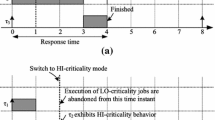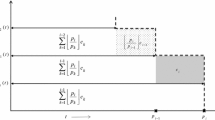Abstract
We consider fixed priority sporadic tasks with arbitrary deadlines to be executed upon a uni-processor platform. Efficient schedulability tests for this task model are required for both online task admission in dynamic systems and interactive design of complex embedded real-time systems. The paper derives novel continuous upper bounds on the worst-case response times which runs in linear complexity. These bounds are not comparable to the tightest existing continuous upper bound of Bini et al. (in: Proceedings of the IEEE international conference on real-time systems symposium (RTSS’15), San Antonio, 2015) and strictly tighter under some parameters configurations. Moreover, the proposed approach allows to combine various existing methods to produce the tightest known continuous response time bounds. These results are extended to be applicable to a wide range of processor and network scheduling problems, including: release jitters, blocking times and cache related preemption delay (CRPD). Response time upper bounds are also given for tasks that are scheduled pre-emptively, co-operatively with intervals where pre-emption is deferred, and non-preemptively. Lastly, the quality of the method is analyzed and various recommendations are provided by means of numerical experiments.







Similar content being viewed by others
Change history
30 August 2017
An erratum to this article has been published.
References
Albers K, Slomka F (2004) An event stream driven approximation for the analysis of real-time systems. In: IEEE Proceedings of the 16th euromicro conference on real-time systems, pp 187–195
Altmeyer S, Davis RI, Maiza C (2011) Cache related pre-emption delay aware response time analysis for fixed priority pre-emptive systems. In: Proceedings of the international conference on IEEE real-time systems symposium (RTSS’11) , Vienna, 29 November–2 December 2011, pp 261–271
Aminifar A, Bini E, Eles P, Peng Z (2016) Analysis and design of real-time servers for control applications. IEEE Trans Comput 65:834–846
Audsley N, Burns A, Richardson M, Tindell K, Wellings AJ (1993) Applying new scheduling theory to static priority pre-emptive scheduling. Softw Eng J 8:284–292
Audsley N, Burns A, Davis R, Tindell K, Wellings AJ (1995) Fixed priority pre-emptive scheduling: an historical perspective. In: Real-Time Systems (RTSJ’95), vol 8, pp 129–154
Baker TP (1991) Stack-based scheduling of real-time processes. In: Real-time systems (RTSJ’91), vol 3, pp 67–100
Baruah SK (2011) Efficient computation of response time bounds for preemptive uniprocessor deadline monotonic scheduling. In: Real-time systems (RTSJ’11), vol 47, p 517
Bini E, Baruah SK (2007) Efficient computation of response time bounds under fixed-priority scheduling. In: Proceedings of the international conference on real-time and network systems (RTNS’07), Nancy
Bini E, Buttazzo GC (2004) Schedulability analysis of periodic fixed priority systems. IEEE Trans Comput 53(11):1462–1473
Bini E, Buttazzo GC (2005) Measuring the performance of schedulability tests. In: Real-time systems (RTSJ’05), vol 30, pp 129–154
Bini E, Nguyen THC, Richard P, Baruah SK (2009) A response-time bound in fixed-priority scheduling with arbitrary deadlines. IEEE Trans Comput 58(2):279–286
Bini E, Parri A, Dossena G (2015) A quadratic-time response time upper bound with a tightness property. In: Proceedings of the IEEE international conference on real-time systems symposium (RTSS’15), San Antonio, December 2015
Bril R (2004) Specification and compositional verification of real-time systems. PhD thesis, Technische Universiteit Eindhoven (TU/e)
Bril RJ, Verhaege WFJ, Pol EJD. Initial values for on-line response time calculations. Proceedings of the international euromicro conference on real-time systems (ECRTS’03)
Bril RJ, Lukkien JJ, Verhaegh WFJ (2007) Worst-case response time analysis of real-time tasks under fixed-priority scheduling with deferred preemption revisited. In: Proceedings of the international euromicro conference on real-time systems (ECRTS ’07), pp 269–279
Bril RJ, Lukkien JJ, Verhaegh WFJ (2009) Worst-case response time analysis of real-time tasks under fixed-priority scheduling with deferred preemption. In: Real-time systems (RTSJ’09), vol 42, pp 63–119
Bril R, Reinder J, Lukkien JJ, Verhaegh WFJ (2009) Worst-case response time analysis of real-time tasks under fixed-priority scheduling with deferred preemption. In: Real-time systems (RTSJ’09), vol 42, pp 63–119
Busquets-Mataix J, Serrano J, Ors R, Gil P, Wellings A (1996) Adding instruction cache effects to schedulability analysis of preemptive real-time system. In: Proceedings of the IEEE real-time technology and applications symposium. IEEE Computer Society Press, pp 204–212
Davis RI, Burns A (2008) Response time upper bounds for fixed priority real-time systems. In: Proceedings of the IEEE international real-time systems symposium (RTSS’08), pp 407–418
Davis RI, Burns A, Brill RJ, Lukkien JJ (2007) Controller area network (can) schedulability analysis: refuted, revisited and revised. In: Real-time system (RTSJ’07), vol 35, pp 239–272
Davis RI, Zabos A, Burns A (2008) Efficient exact schedulability tests for fixed priority real-time system. IEEE Trans Comput 57:1261–1276
Fineberg MS, Serlin O (1967) Multiprogramming for hybrid computation. In: Proceedings of the AFIPS fall joint computing conference, pp 1–13
Fisher N, Baruah S (2005) A fully polynomial-time approximation scheme for feasibility analysis in static-priority systems with arbitrary relative deadlines. In: Proceedings of the international euromico conference on real-time systems (ECRTS’05), pp 117–126, July 2005
Joseph M, Pandya P (1986) Finding response times in a real-time system. Comput J 29(5):390–395
Lee C-G, Hahn J, Seo Y-M, Min SL, Ha R, Hong S, Park CY, Lee M, Kim CS (1998) Analysis of cache-related preemption delay in fixed-priority preemptive scheduling. IEEE Trans Comput 47(6):700–713
Lehoczky JP (1990) Fixed priority scheduling of periodic task sets with arbitrary deadlines. In: Proceedings of the IEEE international real-time systems symposium (RTSS’90), pp 201–209
Lehoczky JP, Sha L, Ding Y (1989) The rate monotonic scheduling algorithm: exact characterization and average case behavior. In: Proceedings of the IEEE international real-time system symposium (RTSS’89), pp 166–171
Liu CL, Layland JW (1973) Scheduling algorithms for multiprogramming in a hard-real-time environment. J ACM 20(1):46–61
Manabee Y, Aoyagi S (1998) A feasible decision algorithm for rate monotonic and deadline monotonic scheduling. In: Real-time systems (RTSJ98), pp 171–181
Nguyen THC, Richard P, Bini E (2008) Improved approximate response time bounds for static-priority tasks. In: Proceedings of the international conference on real-time networks and systems (RTNS’08)
Nguyen THC, Richard P, Bini E (2009) Approximation techniques for response-time analysis of static-priority tasks. In: Real-Time Systems (RTSJ’09), vol 43, pp 147–176, October 2009
Nguyen THC, Richard P, Grolleau E (2015) An FPTAS for response time analysis of fixed priority real-time tasks with resource augmentation. IEEE Trans Comput 64(7):1805–1818
Okwudire CGU, van den Heuvel MMHP, Bril MMHP, Lukkien JJ (2010) Exploiting harmonic periods to improve linearly approximated response-time upper bounds. In: Proceedings of the IEEE conference on emerging technologies and factory automation (ETFA’10), pp 1–4
Richard P, Goossens J (2006) Approximating response times for static-priority tasks with release jitters. In: Proceedings of the international euromicro conference on real-time systems (ECRTS’06)
Seto D, Lehoczky JP, Sha L, Shin KG (1996) On task schedulability in real-time control systems. In: Proceedings of the IEEE international real-time systems symposium (RTSS’96), pp 13–21, Washington, December 1996
Sha L, Rajkumar R, Lehoczky JP (1990) Priority inheritance protocols: an approach to real-time synchronization. IEEE Trans Comput 39(9):1175–1185
Sjodin M, Hansson H (1998) Improved response-time analysis calculations. In: Proceedings of the IEEE international real-time systems symposium (RTSS’98), pp 399–408
Tindell KW, Burns A (1994) Fixed priority scheduling of hard real-time multimedia disk traffic. Comput J 37(8):691–697
Tindell KW, Burns A, Wellings AJ (1994) An extendible approach for analysing fixed priority hard real-time tasks. In: Real-time systems (RTSJ’94), vol 6, pp 133–151, March 1994
Acknowledgements
The authors would like to thank Enrico Bini for his suggestions on the presentation of the paper.
Author information
Authors and Affiliations
Corresponding author
Additional information
An erratum to this article is available at https://doi.org/10.1007/s11241-017-9289-0.
Rights and permissions
About this article
Cite this article
Grass, W., Nguyen, T.H.C. Improved response-time bounds in fixed priority scheduling with arbitrary deadlines. Real-Time Syst 54, 1–30 (2018). https://doi.org/10.1007/s11241-017-9282-7
Published:
Issue Date:
DOI: https://doi.org/10.1007/s11241-017-9282-7




